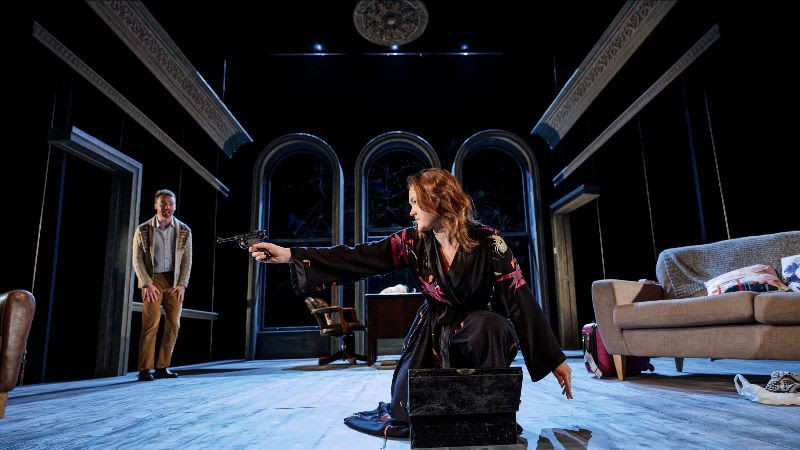
Throughout the current crisis, the Bristol Old Vic Theatre School has demonstrated an admirable determination to fulfil the old dictum that the show must go on. Their latest brave riposte to the closure of theatres is this production of Lucy Kirkwood’s Hedda, her updated version of Ibsen’s Hedda Gabler, streamed live from the Bristol Old Vic.
The play is set in Notting Hill, in George and Hedda’s recently purchased flat. He has bought the property because she once said she would love to live there. She was being whimsical, but he took her at her word, for he has a disastrous tendency to mis-read her shifts in mood. He is an upright, unexciting academic, writing dust-dry papers about ‘robotic ants and the mapping of consciousness’. He will be able to afford the mortgage only if he becomes a senior lecturer, which is by no means certain. Hedda Gabler comes from a grander background than George Tesman, and would find it difficult to economise, commenting that ‘frugal is such an ugly word’. She seeks excitement and personal fulfilment, yet she has married a man who bores her. Unsurprisingly, their honeymoon has not been a success, though George is apparently unaware of how far it fell below Hedda’s expectations. Her dismissive assessment of the experience is that ‘academics are no fun to travel with.’
Charlie Hall touchingly conveys George’s eagerness to please his wilfully capricious wife. We see that he loves her, but he is painfully aware that he cannot meet her needs. Who can? The wayward genius Eli is surely more her type, though in the past his notoriously wild, alcohol-fuelled behaviour ruled him out as a prospective husband. Issam Al Ghussain portrays an Eli who is both colourfully vibrant and terribly vulnerable. He is a much cleverer man than George, but his lack of self-control is a fatal flaw. A true romantic, he shares with Hedda the belief that life should be full of intense experience. But such high-flown romanticism means that the real world is always going to be a bitter disappointment. They are both half in love with death: ‘We always said it should be beautiful’.
Far more down-to-earth is Julia, George’s unmarried sister. Full of fuss and bustle, Tessa Wong’s gently comic performance depicts a woman entirely content with the idea that all will be well in the Tesman Household as long as Hedda quickly produces a baby. She could not be more wrong. Babies are not among Hedda’s chief interests. There is comedy, too, in Dumile Sibanda’s frantic and fidgety depiction of Thea, Eli’s desperately devoted assistant, rendered a near nervous wreck in her attempts to keep him on the straight and narrow.
Who should Hedda have married? It is surely the detached and worldly-wise Toby who would have been best equipped to deal with her demands. A smooth-talking lawyer, he is the only one of the three men in her life who seems to have a clear-eyed view of her character. Michael Drake’s well-judged performance is shot through with amused cynicism, but there is affection, too. It is clear that he and Hedda have been intimate in the past.
Languidly draping herself across the furniture as she waspishly fires off dismissive comments to all and sundry, Emma Hadley-Leonard has created a horribly fascinating Hedda. Here is a woman who sees herself faced with a bleak, sterile future, ‘Shipwrecked in nappy valley, with nothing to do.’ She has always been a bully, only conceding that, at school, when she once threatened to burn off Thea’s hair, she ‘probably didn’t mean it.’ Now, utterly bored, and with little control over her own life, her only defence against suffocating ennui is to try to control those around her. In this she is cruelly manipulative.
Hadley-Leonard delivers Hedda’s barbed put-downs with pin-sharp timing. When George desperately suggests that a future without much material wealth might have something to recommend it, she comments, ‘Dear god, I’ve married a hippy!’ She is in despair over her marriage, and in despair over the lack of purpose in her life. Therein, for me, lies a serious problem with the updating of this play to a modern setting. Sadly, there are many places in the world where women are still expected to accept a life confined within strictly narrow, domestic borders. Notting Hill is not one of those places. Ibsen’s Hedda was trapped in a society with very repressive notions of a woman’s role in society, so we can sympathise with her existential angst. But this Hedda has only herself to blame for the unsuitability of her marriage and for her lack of purpose in her life. In consequence, her disdain for those around her comes across as mere nastiness, and her final acts of destruction are unforgivable. Nevertheless, Hadley-Leonard’s commanding performance is eminently watchable.
Under Jenny Stephen’s direction this production of Hedda features splendid performances from its six young actors. Bronia Houseman has created an impressively detailed set, and I particularly liked Tom Codd’s sound design, with ominous rumblings injecting a touch of real menace at key moments. Bravo! ★★★★☆ Mike Whitton 20th November 2020

